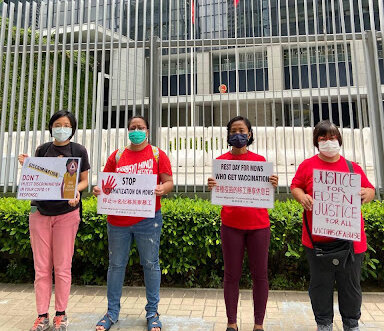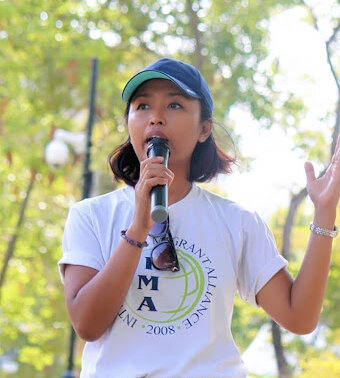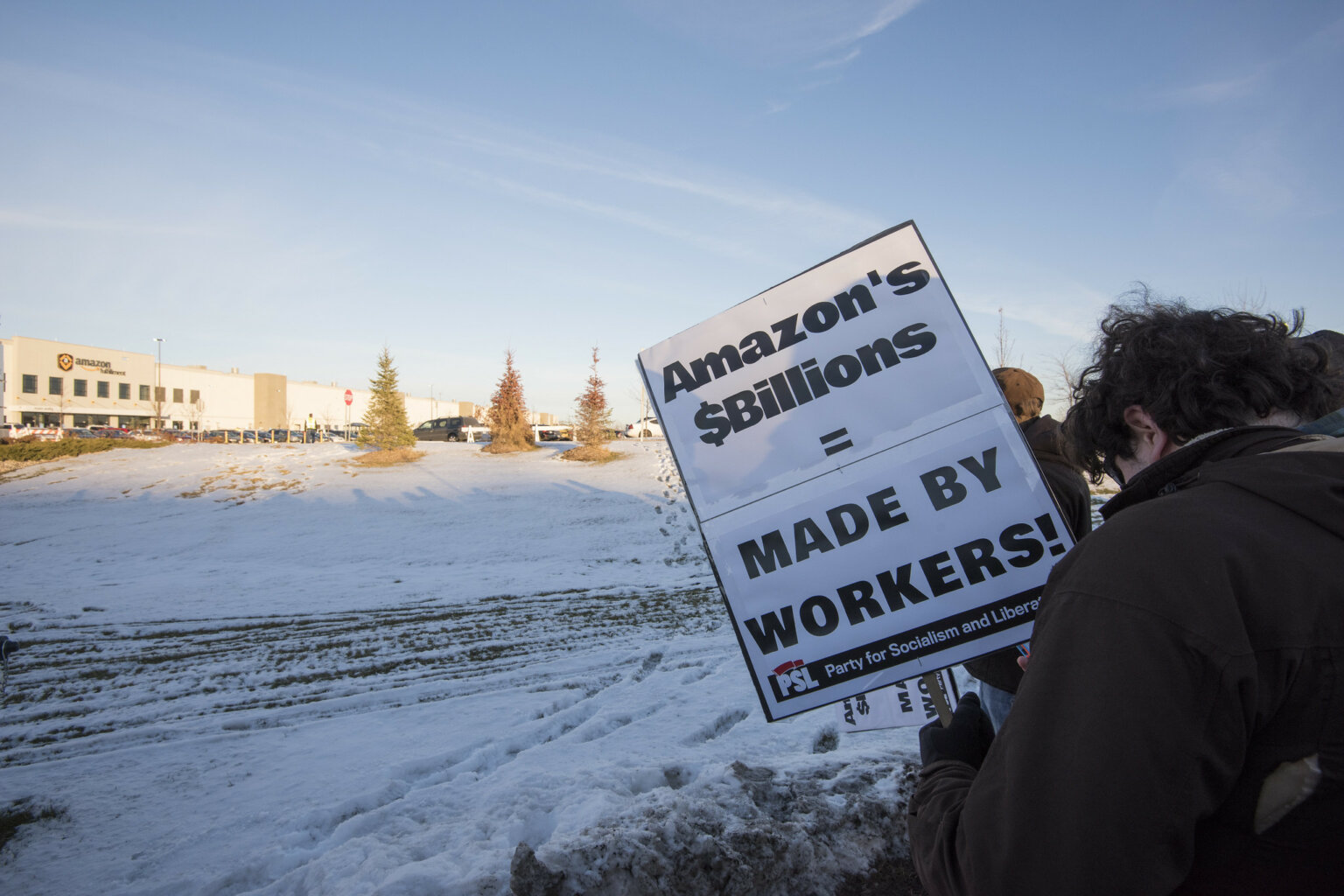- About
- Topics
- Picks
- Audio
- Story
- In-Depth
- Opinion
- News
- Donate
-
Signup for our newsletterOur Editors' Best Picks.Send
Read, Debate: Engage.
| April 26, 2022 | |
|---|---|
| topic: | Discrimination |
| tags: | #COVID-19, #worker's rights, #domestic workers, #Hong Kong |
| located: | Hong Kong, China, Indonesia |
| by: | Ananta Agarwal |
Eni Lestari is the chairperson of the International Migrants Alliance (IMA), which was formed in 2008. IMA has since then grown to include more than 120 member organisations in more than 30 countries.
The majority of Hong Kong’s 330,000 domestic workers come from Indonesia and the Philippines. They form the backbone of the economy, managing the domestic labour of cooking, cleaning and caring for the elderly in thousands of households.
The minimum wage for domestic workers is HK$ 4,630 per month, roughly half the minimum wage of other workers in Hong Kong. Legally, domestic workers are also required to live with their employers, which makes them vulnerable to abuse and exploitation.
Many domestic workers don’t have a private room or reasonable space in their employers’ house. On Sundays, their only rest day of the week, domestic workers like to gather in public spaces so that they can enjoy the day without being subjected to any working requests employers may make.
The peak of the fifth wave of COVID-19 in Hong Kong saw multiple domestic workers abandoned and left without shelter by their employers after testing positive for coronavirus. The reports prompted government warnings that such dismissals are illegal and liable to prosecution and fines of up to HK$100,000.
In February, the police also handed out HK$5,000 penalties to more than fifteen domestic helpers for breaking the social distancing rules. The fines, which were greater than their minimum monthly wage, prompted outrage from the local community. A fundraiser was started by a group of citizens to help domestic workers pay the fines but it was axed after officials said the fundraiser may be illegal for "abetting a crime."
In 2019, there were approximately 400,000 domestic workers in Hong Kong, according to government statistics. Since then, their number has declined by almost 70,000.
In the midst of these changes, the International Migrants Alliance (IMA) tries to find innovative ways to advocate for the rights of domestic helpers, both online and offline. The IMA has partnered and continues to work with NGOs and other migrant rights groups to provide shelter, care packages and other emergency services to distressed workers during the crisis.
FairPlanet: You have said previously that you escaped a difficult situation with your employer and that propelled you towards advocacy. Can you talk a bit about your journey?
Eni Lestari: When I first came to Hong Kong in 2000 as a migrant domestic worker, the agency I was recruited by took away my passport and my contract. They told me that my salary as an Indonesian worker was only HK$1,800. The minimum wage at that time was HK$3,670. I was told I would not be given a day off for two years and I wouldn’t be allowed to go out without my employer’s permission.
I didn’t know anything about the legal rights of domestic workers in Hong Kong at the time. The agency told me to be patient. But I could not bear my condition anymore, I felt very exploited. After seven months, I ran away and went to The Mission for Migrant Workers .
They told me all domestic workers in Hong Kong, whether Filipino or Indonesian, should be paid the same amount, and they have the same rights. That’s when I realised I was cheated, both by the agency and the employer. I filed my case with the Labour Department, which meant I was unemployed for five months. I used that time to learn about legal rights in Hong Kong. I realised how little domestic workers are informed about these rights.
I founded the Association of Indonesian Migrant Workers in Hong Kong with other migrants who also ran away from the agency. The organisation promoted the knowledge of legal rights of domestic workers and also helped our friends who were being abused and terminated without fair compensation. I became the chairperson of this group and then after that, I expanded our reach into other countries, helping organise migrant workers in Macau, Taiwan and other areas [due to COVID-19, the majority of the work outside Hong Kong has been carried out online via webinars]. Now we have the IMA.
The fifth wave was by far the hardest on domestic workers. Can you talk about the hardships the community has faced?
The COVID-19 pandemic only multiplied the issues that existed long before. Our problems are structural. For example, under the law, you must live with your employer. What does that mean? You don’t have space; you don't have room. Many domestic helpers sleep on the floor, in cabinets, and on sofas.
[Legally, employers in Hong Kong are required to provide "suitable accommodation" to domestic helpers with reasonable privacy. Employers can’t, as per examples given by the Hong Kong government, make domestic helpers sleep on makeshift beds in corridors. However, the definition of suitable is still malleable, given the small size of Hong Kong’s apartments. According to the 2021 report by Mission for Migrant workers, two out of five domestic helpers reported not having a private room to rest in].There is no regulation on food, so you have to rely on how much your employer gives you. There is no easy access to legal mechanisms to even file cases. You cannot file cases against your employer for not giving you enough food. It's not part of employment contract violations.
Another structural problem is that the minimum wage is very low and that is decided by the Labour Department. There is no transparency in the process. You cannot even argue, debate or recommend. There is no legal mechanism to challenge what you cannot accept.
Then there are the visa restrictions. You can only be a domestic worker, you can only work for one employer and you have to leave Hong Kong within 14 days if you lose your job. These structural problems are the reason why there are so many issues during the pandemic. These issues amount to forced labour and modern-day slavery. Our problems are complex and comprehensive. Our economic, political and socio-cultural rights are not recognised at all.
"There is no regulation on food, so you have to rely on how much your employer gives you. There is no easy access to legal mechanisms to even file cases."
How has the pandemic worsened these problems?
One change has been that working hours now on average are 14-19 per day because families and children are staying at home. We aren’t getting enough sleep. Second, many employers are using the restrictions on gatherings as a way to deny us a day off. When you gather at the park, you become a target of [COVID-related] discrimination and you are fined.
But the biggest problem now is there are more terminations of domestic workers. Some of the domestic workers who have not seen their children and husbands in years are forced to terminate their contracts because their employers won't allow them to leave. They think it would cost them too much to return to Hong Kong. Then some are terminated because their employers lose their jobs. Some of them resigned because the work became too much, the treatment became unbearable and they didn’t know how to cope with that.
And now during the fifth wave, there are even more terminations, because many domestic workers are testing positive [FairPlanet could not obtain precise figures]. Because it’s not easy to change employers, many are forced to leave, too.
Another problem is exclusion from any support by the government. The government has given subsidies and financial assistance to the public, except for domestic workers. There was not even one dollar given to us.
Now, there is some improvement. There are fewer confirmed COVID cases. During the peak, we were running programmes to deliver care, medicine, to rescue, provide shelter and information while working long hours.
Domestic workers have often been especially targeted by the government in their warnings to adhere to restrictive measures. Do you think that this invites censure and discrimination against domestic workers?
What is the difference between going out on Sundays and going out to the market every day? Most of the infection clusters did not happen in the parks. They happened in the markets, shopping malls and restaurants and in other crowded places. That’s why we feel it's unfair. The public is still going out on Sundays, to restaurants and malls, to beaches and outlying islands.
"These issues amount to forced labour and modern-day slavery."
The issue here is really the access to space. When public spaces are closed off to us on Sundays, domestic workers don’t know where to go and rest. We don't have any housing. Our salary is too low for us to sit inside coffee shops from morning to night.
When we have a day off, we try to minimise expenses. So that’s why it's natural for us to gather in public spaces. The easiest help from the government would be to give us access to open spaces and enforce social distancing of 1.5 to 2 metres. But we are not given this access and are forced to gather in smaller spaces, [and subsequently] we are fined. I think that is quite unfair.
Do you have any thoughts on how the media reports the issues of domestic workers? Are there ways in which they could improve their coverage or issues you wish they’d give more attention to?
Many of Hong Kong’s English media try their best to present more in-depth realities of migrant domestic workers, but Chinese media is more sensational. Only when there is something happening, will they report our plight. But it's on a very surface level. They don’t really investigate the structural causes of our problems.
You will hear reports like - ‘These helpers are gathering on the streets, under the bridge, they are breaking the law, they are dirty, they don’t wear masks.’ We are being blamed and stigmatised. If they ask us, ‘Why don't you sit in the park?’ We will tell them the park is closed. ‘Then why don't you rest in restaurants and cafes?’ Our salary is very low. How can we buy all that food?’ But no one is really asking us these questions.
In light of these problems, what role has the International Migrants Alliance played in advocating for the rights of domestic workers’?
The International Migrants Alliance is operating in the global arena. We are doing advocacy with the United Nations and with different regional and international bodies to present issues faced by migrants on the ground.
We are going to New York in May to attend the International Migration Review forum for United Nations Global Compact on Safe, Orderly and Regular Migration. This is an opportunity to raise our concerns. But this doesn’t really change much in the immediate sense.
In the past two years, we have conducted so many webinars among migrants’ groups in Hong Kong and Macau for workers to come together and define what will be our main campaign and how we can strategise it. Hong Kong is strict on mobility, so we have to be very careful not to challenge the pandemic regulations. For now, we try to come up with innovative methods to fight, we use a lot of online platforms.
In the past year, we were able to conduct several press conferences that received a lot of attention. We also campaigned for domestic workers who experienced abuse, especially sexual and physical abuse. We are petitioning the government and we also organise 4 by 4 protests. So we try to use different ways to raise our voices. It’s not easy, but we do it.
In terms of advocacy, it often feels like domestic workers are fighting their battles alone, especially when it comes to larger structural issues. Do you think there is anything the public can do? Or do you feel that a certain responsibility also rests on employers?
It is possible, but yes, we will need a lot of support from the local community. When the employers speak out, it makes changes. If the Hong Kong public speaks out, then the government will not do whatever it wants to do.
But if it's just us speaking out, then all you hear is - ‘who are you?’ So the key to structural change is really more local solidarity and more support from the public. It is actually one of our biggest challenges: how to get the public and good-hearted employers to also speak up on our behalf. But this part is the hardest.
Image by End Lestari.
By copying the embed code below, you agree to adhere to our republishing guidelines.



